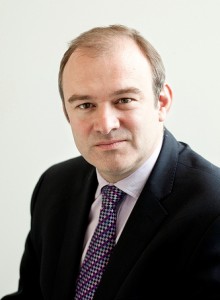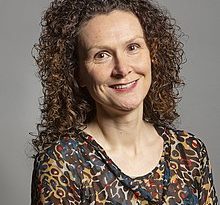Ed Davey – 2012 Speech on Cornwall Together
Below is the text of the speech made by Ed Davey, the then Secretary of State for Energy, on 23 July 2012.
Thanks very much – it’s absolutely fantastic to be here at the Eden Project, whose low-carbon credentials are impeccable.
The world’s first eco car show. Plans for an 80% cut in emissions by 2020. And a new deep geothermal energy system, drawing heat from Cornish stone to warm the biomes and feed into the grid.
These are all real achievements. But what I find most impressive is the work Tim and the team here have done to bring environmental issues into the national consciousness.
The Eden Project is the one of the most recognisable green ‘brands’ in the world. Everyone knows what it stands for: sustainability, not just in environmental terms, but in a social context, too.
The scheme we are here to launch today speaks to the same agenda. Helping people save money. Helping communities benefit from energy projects. And hopefully saving carbon, too.
I’ve been a consumer advocate for many years. As an MP, and as a Minister at the Department for Business, where consumer affairs and competition was a big part of my brief. I even launched a Consumer Empowerment Strategy, to help people realise the power they have to get a better deal.
So I know the consumer landscape well. And I’m absolutely clear that getting more competition in our energy markets, and helping people take advantage of it, is vital.
That’s why one of my top priorities after taking this job was to focus on collective switching and collective purchasing.
Everyone here today knows that the way people buy energy – and who they buy it from – can make a real difference. But that message isn’t making out to the wider world.
In 2010, we saw significant energy price rises. Wholesale energy costs soared, driving up consumer bills. Yet consumer switching rates fell.
In 2010, just 15% of us switched gas suppliers, down from 19% in 2006. For electricity, it was even worse: 17% of consumers switched, down from 22%.
We need to better understand why – and what we can do to turn that around. And I believe the first thing to do is to give people better information.
We want to see fewer tariffs and much clearer pricing, so that customers can find the best deal more easily. We want people to have access to better information about their energy consumption, with smart meters to help consumers monitor and manage their energy use.
But better information isn’t enough. We also need to give people more power in the energy markets, which is where collective switching can really come into its own.
We’ve seen a few partnerships starting up, with Which? and the campaigning group 38 degrees coming together for the Big Switch, successfully carrying out a reverse auction that was won by Co-operative Energy.
At a time when householders everywhere are looking to cut their bills wherever they can, such schemes have grabbed media attention.
And I’ve been clear from the start that this is about more than commercial opportunities.
It’s about more than helping those who are already clued up. I want to see new providers – not just the usual suspects, not just the private sector, but charities and the public sector too – coming up with schemes that can reach the most vulnerable consumers. I want the benefits of collective switching to be open to all communities.
That’s why Cornwall Together is such a fantastic initiative.
Not just because this is the first time a county has joined together to help people save. Not just because it’s coming from a new angle, by working with big employers in Cornwall, across sectors. Not just because it encourages people to think about more sustainable energy options.
But also because this is the first collective switching scheme I’ve heard of that will actively target the hard-to-reach the households who most need help. And 1 pound out of every 10 generated will go into a fund for Cornish communities.
This scheme really is the first of its kind. And I sincerely hope it’s the first of many.
I want to congratulate everyone who has put the work in to get this far. Thanks to your efforts, Cornish households could save up to 20% on their energy bills. For the most vulnerable, who spend a greater proportion of their income on energy, that can make a huge difference.
Everyone here today knows that fuel poverty is a difficult and pernicious problem. Cold homes harm the health of those least able to cope. Children. The elderly. People with disabilities or long-term illnesses.
For those who are already struggling to get by, worrying about keeping warm adds another layer of stress.
Being able to heat your home adequately and affordably ought not to be a luxury, but a basic right.
High energy prices, low household incomes, and energy inefficient homes are the main drivers of fuel poverty. And like other types of inequality in our society, there are few simple solutions.
We’re doing what we can to help. We’re working with energy suppliers. We provide direct support to households who are vulnerable and in fuel poverty. And – in the long term – we’re trying to limit our exposure to volatile global energy markets.
But we have to be realistic: income and prices are the two parts of this equation that we have the least control over. For government, it makes sense to really focus our efforts on energy efficiency.
That’s why the Green Deal and the Energy Company Obligation are so important.
I want every household in Britain to benefit from energy savings; it’s good for consumers, good for the climate, and good for growth.
But it’s the poorest and most vulnerable who need the most help, and that’s what the Affordable Warmth and Carbon Saving Communities parts of the ECO are designed to provide.
Every year, they will help around 230,000 households to install energy efficiency measures worth £540 million.
I believe that’s going to make a real difference. But it’s not enough. Because when it comes to fuel poverty, we face a problem which – on the current measure – affect 4 million households.
That’s why I’m so passionate about encouraging collective purchasing and switching. Particularly when it’s done by genuine partnerships, who are working to help whole communities.
Just like Cornwall Together.
Once again, I want to congratulate everyone involved in this groundbreaking project; and wish you all the very best in the months and years to come. Thank you.


